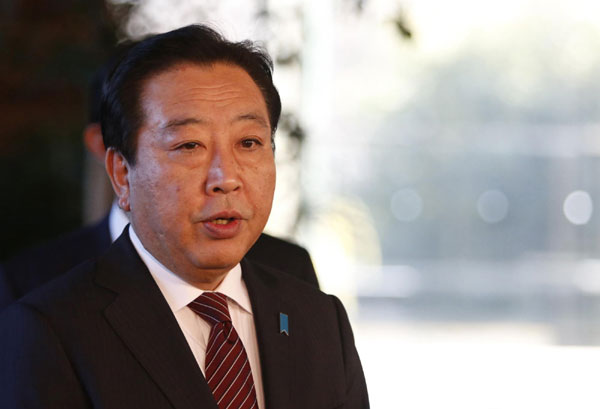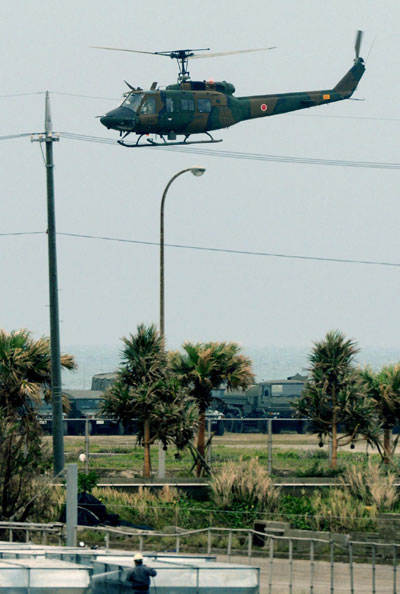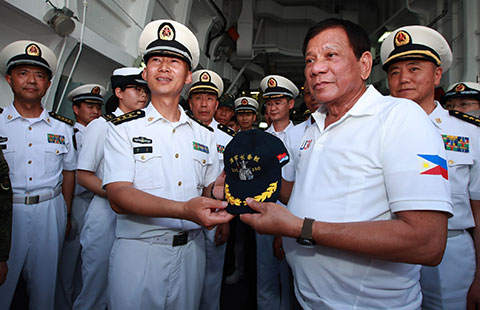

 |
|
Japan's Prime Minister Yoshihiko Noda speaks to media after a meeting of the security council of Japan at his official residence in Tokyo Dec 12, 2012. DPRK successfully launched a rocket on Wednesday, boosting the credentials of its new leader and stepping up the threat the isolated and impoverished state poses to its opponents. The rocket, which DPRK says was designed to put a weather satellite into orbit, has been labelled by the United States, ROK and Japan as a test of technology that could one day deliver a nuclear warhead capable of hitting targets as far as the continental the United States.[Photo/Agencies] |
TOKYO - Japan on Wednesday strongly protested against a satellite launch by the Democratic People's Republic of Korea (DPRK), saying the launch was "unacceptable" and violates the United Nations' relative resolutions.
Japanese Chief Cabinet Secretary Osamu Fujimura said at an emergency press conference that the launch threatened regional peace and stability and violated UN resolutions, adding the launch was "regrettable" and "unacceptable."
Foreign Minister Koichiro Gemba said his ministry has expressed protest through diplomatic channels to the DPRK and has asked the UN to adopt severe sanctions on the DPRK over the rocket launch.
Japan has also requested the UN to convene an emergency Security Council meeting on Wednesday.
 |
|
A helicopter of the Japan Self-Defence Forces takes off after DPRK launched a rocket, in Ishigaki on Japan's southern island of Ishigaki Island, Okinawa prefecture, in this photo taken by Kyodo Dec 12, 2012.[Photo/Agencies] |
The liftoff is taken only four days ahead Japan's general election. Main political parties also condemned the DPRK for launching the rocket.
Jun Azumi, acting secretary general of the ruling Democratic Party of Japan headed by Prime Minister Yoshihiko Noda, said DPRK's act can not be tolerated.
Japan's main opposition party, the Liberal Democratic Party led by former prime minister Shinzo Abe, said in a statement that the launch damaged peace and stability in the East Asian region and is a challenge against the international community.
The DPRK blasted off its rocket at around 9:49 am local time and it passed Japan's Okinawa at around 10:01.
Immediately after the launch, Prime Minister Noda ordered all related ministries to be fully prepared and spare no effort to prevent any unforeseen accident from occurring.
Japan also issued alarms to Okinawa's local government through its national alarm system.
As no debris of the launch fell into Japan's territory, Defense Minister Satoshi Morimoto did not issue destroy order to the Self- Defense Forces deployed in Okinawa and no missile interceptors were launched.
No damage has been reported in Japan so far. Morimoto said Japan and the United States is closely working on collecting and analyzing information related to the launch.
After the blastoff, Noda, along with his Cabinet members including Gemba and Morimoto, convened a security council meeting.
The DPRK originally planned to launch a satellite between December 10 and 22 from 7 am to noon and announced on Monday that it extended the launch window to December 29, saying the launch will be readjusted for some reasons.
Just one day before the launch, there were reports that the DPRK had removed the rocket from the launch pad, indicating it would not carry out the blastoff soon.
Now, the DPRK said it has successfully sent its satellite into orbit through the rocket. However, some countries considered that the launch is DPRK's test for long-range ballistic missile.
The DPRK attempted a satellite launch in April to mark the 100th birthday of late DPRK founder Kim Il-sung. But the rocket failed to send the satellite into orbit and crashed into sea.












